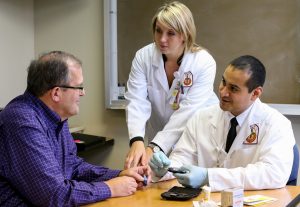3.2.6 Observation and Problem Solving Case Study 2
This case study is adapted from a real situation. All names are aliases, and any identifiers are removed for privacy.
Case Study
Mr. Olifand is a 68-year-old male who is in seeing his doctor at his spouse’s insistence. He does not believe he has any reason to see the doctor and states he feels fine. His spouse detailed their concerns to the doctor prior to the visit, stating over the last several months they have noticed his behaviour changing—he doesn’t want his usual breakfast anymore and he doesn’t want to go out with his friends—but he doesn’t seem to be physically having problems. He also keeps to himself, forgets things and repeats questions. The doctor assesses the heartbeat, lungs and blood pressure of the client, noting all are normal for the client. The client is only taking multivitamins. The client states he has had no pains other than a backache that bothers him now and then. When talking to the doctor, he appears to be fine: he is talking slowly, but not joking as he usually would; he seems relaxed; his speech is clear; and his eyes are clear. He follows the doctor’s directions slowly, but he is hard-of-hearing and the doctor has to repeat what he says a few times. He has no trouble getting up and moving around. The doctor asks him to answer a few questions, which are listed here with Mr. Olifand’s reponses:
- What is the date? Mr. Olifand does not know offhand, but says since he is retired he doesn’t need to know.
- What month is it? Mr. Olifand doesn’t know, but states it must be summer because it is hot.
- How is your family doing? Can you tell me about them? Mr. Olifand cannot remember where his children live, but they are fine; he cannot think of the names of the grandkids, but he says he has so many it is hard to keep track.
Your Task
Answer the following questions:
- What types of issues are being raised with the client’s assessment?
- What might be the cause(s) of these concerns?
- What systems of the body might be related to these concerns?
After completing these tasks by writing your answers in your notes, please scroll down below the following image for your case study feedback.

Case Study Feedback
The following feedback for the chapter case study is meant to provide guidance for your own practice. The answers provided are suggestions, and you may have additional ideas which are not covered below. Then, the resolution of the case as it occurred in real life is provided for your reference.
Feedback
At the age of 68, Mr. Olifand should be able to know the date or at least the month. Mr. Olifand’s cognitive functioning is most likely impaired. We also know that there has been a recent change in his behaviour, as per his spouse. There are many possible causes for a noticeable decline in cognitive abilities, including stroke, Alzheimer’s and dementia. The systems of the body that are involved could be circulatory (i.e., affecting the supply of oxygen to the brain), or nervous (i.e., affecting the workings of the brain).
Resolution
The doctor arranged for an EKG for the heart, a doppler study for blood flow to the brain, an MRI of the brain and an assessment of his cognitive functioning, and he referred the client to a gerontological specialist. Mr. Olifand was diagnosed with Vascular Dementia.
Media Attributions
- How to make most of doctor’s appointment © Army Medicine is licensed under a CC BY (Attribution) license

